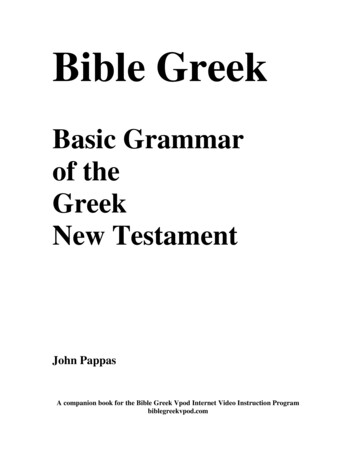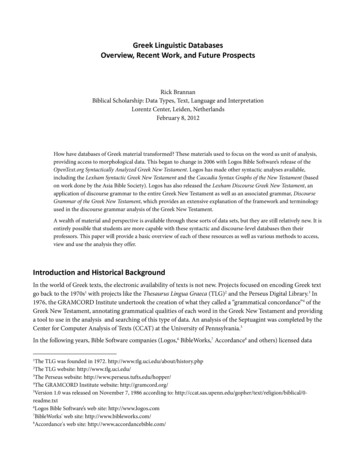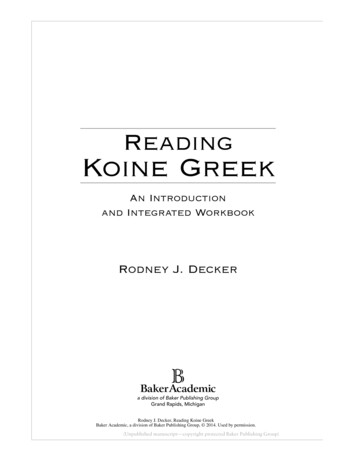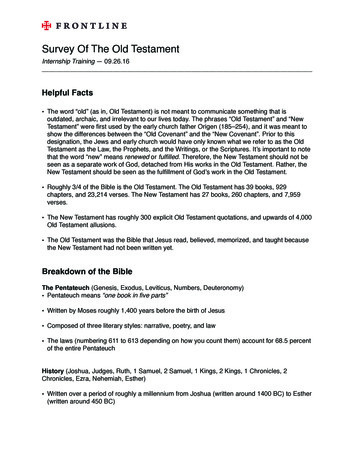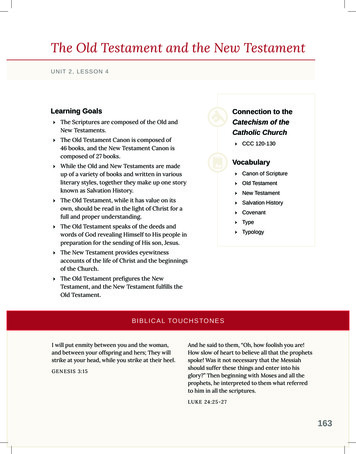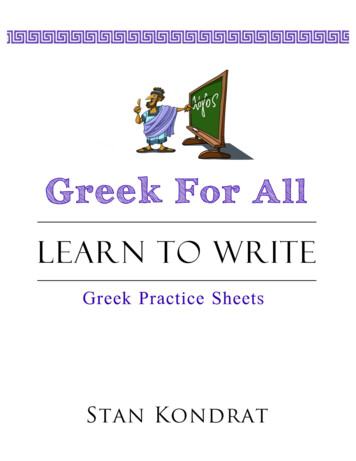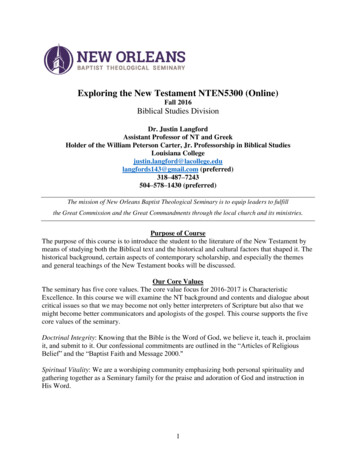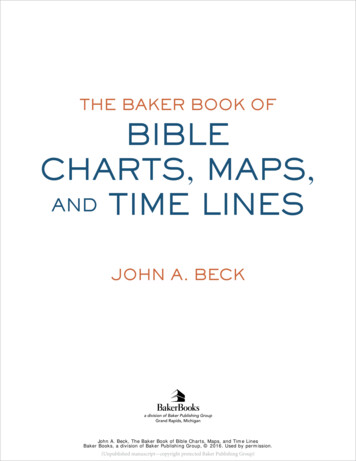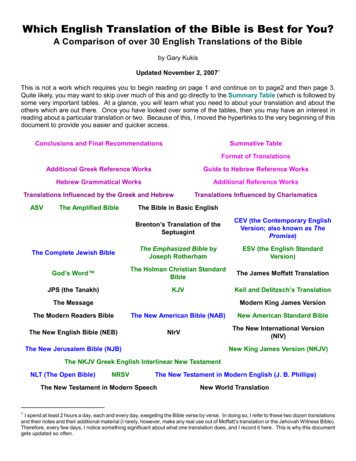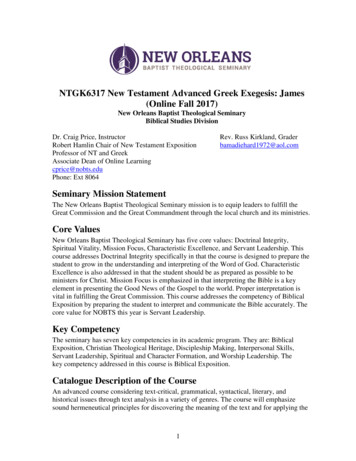
Transcription
NTGK6317 New Testament Advanced Greek Exegesis: James(Online Fall 2017)New Orleans Baptist Theological SeminaryBiblical Studies DivisionDr. Craig Price, InstructorRobert Hamlin Chair of New Testament ExpositionProfessor of NT and GreekAssociate Dean of Online Learningcprice@nobts.eduPhone: Ext 8064Rev. Russ Kirkland, Graderbamadiehard1972@aol.comSeminary Mission StatementThe New Orleans Baptist Theological Seminary mission is to equip leaders to fulfill theGreat Commission and the Great Commandment through the local church and its ministries.Core ValuesNew Orleans Baptist Theological Seminary has five core values: Doctrinal Integrity,Spiritual Vitality, Mission Focus, Characteristic Excellence, and Servant Leadership. Thiscourse addresses Doctrinal Integrity specifically in that the course is designed to prepare thestudent to grow in the understanding and interpreting of the Word of God. CharacteristicExcellence is also addressed in that the student should be as prepared as possible to beministers for Christ. Mission Focus is emphasized in that interpreting the Bible is a keyelement in presenting the Good News of the Gospel to the world. Proper interpretation isvital in fulfilling the Great Commission. This course addresses the competency of BiblicalExposition by preparing the student to interpret and communicate the Bible accurately. Thecore value for NOBTS this year is Servant Leadership.Key CompetencyThe seminary has seven key competencies in its academic program. They are: BiblicalExposition, Christian Theological Heritage, Discipleship Making, Interpersonal Skills,Servant Leadership, Spiritual and Character Formation, and Worship Leadership. Thekey competency addressed in this course is Biblical Exposition.Catalogue Description of the CourseAn advanced course considering text-critical, grammatical, syntactical, literary, andhistorical issues through text analysis in a variety of genres. The course will emphasizesound hermeneutical principles for discovering the meaning of the text and for applying the1
text in teaching and preaching. Students may repeat the course for non-reduplicating books.Prerequisites: Introduction to Biblical hermeneutics; Exploring the New Testament;Introduction to Greek Grammar; and Intermediate Greek Grammar.Student Learning ObjectivesThis course will consist of a thorough study of selected passages from the Greek NewTestament. Consideration of pertinent historical and cultural issues, and interaction with themajor literature and commentaries will be conducted. The student will translate thepassages considering morphology, syntax, diagramming, and exegesis. The course willemphasize proper methods for utilizing the information discovered through exegesis tomake application to teaching and preaching the text of the New Testament.Student Learning ObjectivesTo interpret and communicate the Bible accurately, the student, by the end of the courseshould:1. Apply Greek vocabulary recognition and grammatical and syntactical analysis fortranslation and interpretation to the practice of interpreting and communicating theBible accurately.2. Value working with the original Greek language.3. Exegete the New Testament with the help of resources.4. Translate the Greek text of the New Testament.Knowledge (cognitive)Students who complete this course successfully should: Know more thoroughly the significance of Greek grammar for translation ofthe James Increase knowledge of the basic methods of studying Greek grammar thatwillcontribute to a regular application of Greek grammar in teaching andpreaching of James Solidify knowledge of basic principles of Greek grammar that leadinterpreters todiscover the meaning intended by the biblical author Master the major areas of Greek morphology, especially regarding both verbandnoun systems, including so-called “irregular” verbs Increase vocabulary acquisition to words occurring 15 or more times in theNewTestament to facilitate reading and use of the Greek New Testament Understand more thoroughly the major theories and the basic principlesdealing with issues of translation of James Understand syntactical issues as they relate to the exegesis of James Learn the basic principles of textual criticism to understand the textualvariants in James2
Attitudes (affective)Students who complete this course successfully should: Appreciate the richness of the Greek language Recognize the importance of original language for sound exegesis inJames Be more confident in interpreting the biblical text of JamesSkills (psychomotor)Students who complete this course successfully should: Increase skills for translating New Testament Greek Increase his/her understanding and grasp more deeply grammatical issuesin translation that affect an understanding of the biblical text James forpreaching and teachingRequired TextsClass TextbooksBlomberg, L. Craig and Kamell, Mariam J., Exegetical Commentary on the NewTestament: James, Clinton E. Arnold, Gen. ed., Zondervan, 2008.This commentary phrases the text in English and will be very helpful for thestudent in phrasing the exercises in the class workbook.Davids, Peter H. The Epistle of James, in The New International Greek TestamentCommentary. Eerdmans, 1982.Martin, Ralph P. James, Word Biblical Commentary.Vol. 51, gen. eds. DavidA. Hubbard, Glenn W. Barker. Dallas: Word Publishing, 1988.Price, Craig. Biblical Exegesis of New Testament Greek: James. Eugene, OR: 2008.Greek TextUnited Bible Society’s 5th rev. ed. of the Greek New Testament with Dictionary.ORNomum Testamentum Graece, 28th ed. (NA 28), ed. Barbara and Kurt Aland.Recommended TextsLexicalDanker, Frederick William. A Greek-English Lexicon of the New Testament and OtherEarly Christian Literature. 3d ed. Chicago: University of Chicago, 2000.This lexicon is the current standard for Greek studies. It is thorough and extremelyhelpful for the student. Most Greek software packages offer it as an add-on resource.It is very helpful and should be in every serious Greek student’s library.3
Text CriticalMetzger, Bruce M. A Textual Commentary on the Greek New Testament. 2nd ed. NewYork: American Bible Society, 1994.This little commentary is expensive, but details Metzger’s decisions for selectingmany of the variant readings found in the Greek text. This book will assist you inanswering many of the questions in the class workbook.Greek GrammarsMounce, W. D. Basics of Biblical Greek. 3rd ed. Grand Rapids: Zondervan, 1993.A standard among Greek grammars. Now in its third edition, this work is used formost college and seminary introductory Greek courses. This work is a greatedition for every serious Greek student’s library. The book is inductive in approachto learning Greek.Stevens, Gerald L. New Testament Greek Primer, 2nd ed. Eugene, OR: Cascade Books,2007.This Greek grammar is published by NOBTS Greek guru, Dr. Jerry Stevens. Thegrammar is deductive in approach and is loaded with detailed information forusing the Greek language. The exercises are systematically keyed forprogrammed learning of the language. It is a very helpful resourse for seriousGreek students. New Testament Greek Intermediate. Eugene, OR: Cascade Books, 2008.This intermediate grammar extends the process of the Primer above. This is alsovery helpful for Greek studies and should be in your library.Wallace, Daniel B. The Basics of New Testament Syntax: An Intermediate GreekGrammar. Grand Rapids: Zondervan, 2000.Wallace’s grammar is now a standard in the field. Although it does not replaceRobertson’s grammar, it is a working grammar that you will use regularly inadvanced Greek studies. This is a must have for every serious Greek student’slibrary.Schedule and AssignmentsThe student will be expected to complete the lessons in the textbook each week during thesemester. Read the appropriate sections of the class required commentary for the portion ofScripture covered in that week’s lesson.(Note: Entry to your Blackboard Class Shell is restricted until your account has beencleared by the Business Office. Once cleared, the Business Office notifies the InformationTechnology Center and they place your name in the Blackboard class shell)For purposes of this course, each week will begin on Sunday (except for the first week) andend on Saturday (except for the last week). Phrasing exercises are due in the DiscussionBoard by each Saturday night4
Week 1 Lesson 1Week 2 Lesson 2Week 3 Lesson 3Week 4 Lesson 4Week 5 Lesson 5Week 6 Lesson 6Week 7 Lesson 7Week 8 Lesson 8Aug 21-26Aug 27-Sept 2Sept 3-9Sept 10-16*Background Paper Due SaturdaySept 17-23Sept 24-30Oct 1-7Oct 8-14Fall Break (Week 9) No classWeek 10 Lesson 9 Oct 22-28Week 11 Lesson 10 Oct 29-Nov 4Week 12 Lesson 11 Nov 5-11Week 13 Lesson 12 Nov 12-18Week 14 Lesson 13 Nov 19-25 Thanksgiving Break (no class)Week 15 Lesson 14Week 16 Lesson 15Finals WeekNov 26-Dec 2Dec 3-9Exegesis Paper DueDec 14 Completed notebooks are due11:59 PM CST GraduatingSeniors must complete their notebooks by Tuesday of this weekand alert the Grader for early gradingExegesis Paper Due: Dec 9 (online in the assignment box; or if mailed, postmarked thisdate)Completed Notebook Due in the Online Learning Center: Dec 14 by 4:00 PM, or if you aremailing the notebook, the mailer must be postmarked Dec 14to be considered on-time.Attention Graduates!!If you are planning to graduate this semester, please let our office know via email or phoneprior to the last day of class. This will enable us to have your work graded and grades turnedin to the Registrar before their deadline for graduating seniors.Grading PercentagesPart of ministry preparation is learning how to prepare for deadlines. We recommend thatyou prepare a Study Plan. First, take all your course syllabi and mark all your assignmentsand deadlines on the calendar (exams, papers, Discussion Boards, quizzes, and the like).Second, back up from each calendar deadline date an appropriate amount of time you(realistically) believe it will take you to prepare for the project. Mark that as the start dateyou anticipate you will begin studying or preparing for that project to meet its deadline.Third, stick to your calendar Study Plan for the best success.You will be working with deadlines all your ministerial career. Meeting your deadlines are a5
huge part of your professionalism and ministerial preparedness. Take your deadlinesseriously and you will be more highly respected in your places of service.Grades will follow the Graduate School Catalog grading scale. See below for instructions onsubmitting all projects for grading. Grades will be based upon the following break-down:Greek Workbook (completed)Background PaperExegesis PaperDiscussion Board/Phrasing1) Greek Workbook Lessons 30%:30%20%40%10%Due Date: Dec 14The weekly lessons are in the class textbook authored by Dr. Price. The phrasing andsermon outline portions may be hand written into the workbook OR the student maydownload the Greek text from Blackboard. We recommend that the student download theGreek text (either from Blackboard or from your own language software) and cut and pastethe passages for phrasing each lesson. The student will discover that working with the textin a word processor is easier. These sheets are then easily inserted into the student’sWorkbook along with the sermon outline for each lesson. Convert your work to PDF beforesubmitting them into Bb. Bb often changes formating of Word docs.If you are mailing your workbook in, be sure to include a self-addressed, self-stampedmailer with adequate postage. We have no budget for return postage.2) Background Paper 20%Due Date: Sept 16This paper is to be 5-7 pages of single spaced using Turabian or SBL style. The pagerequirement does not include bibliography and frontal pages. The bibliography is to containa minimum of 6 sources. Include the required texts for the course and four other criticaltype commentaries that deal with the Greek text. The use of devotional type commentariesmay be used in the application exercises, but a minimum of six critical commentaries mustbe utilized. Convert your work to PDF before submitting them into Bb. Bb often changesformating of Word docs.3) Exegesis Paper 40%Due Date: Dec 9The student will write a paper on a selected passage of his/her choosing. The passage will bechosen in consultation with the instructor. This section will be 8-15 pages of text, singlespaced and footnoted to Turabian or SBL style. The page requirement excludesbibliography and frontal pages. The bibliography is to contain a minimum of 8 sources,using commentaries that focus on grammar, language, and syntactical issues (see thedetailed description below). Convert your work to PDF before submitting them into Bb. Bboften changes formating of Word docs.6
4) Discussion Board 10%Due Date: WeeklyDiscussion questions will be posted weekly. Each class member will log on to theBlackboard course and interact with the other classmates about that week’s DiscussionBoard. For Lessons 1-2, we are looking for 2-3 quality postings each week. A quality post isone were the student interacts with other classmates with ideas, opinions, answers, etc. Wewant you to post more than something like, “I agree,” or “Yes/no,” etc. We are looking forthoughtful interaction.Beginning at Lesson 3, you will upload your phrasing for that week plus your sermonoutline that is based upon your phrasing exercise. Your phrasing and sermon outlines aredue by midnight on the closing date for that given week. See the schedule in the syllabus forthe dates. You may check your work by consulting Blomberg’s Commentary where hephrases the passage in English. You will phrase the passage in Greek for this course, but theEnglish phrasing will help you learn the technique.Guidelines for Writing Class Papers1. Background PaperThe student will write a historical background paper on James. This information iscontained in the front matter of most commentaries, NT introductory texts, and otherreference materials. Be sure to include all the information in this guide. The historicalbackground study will include the following:1) background information on James2) information on the setting, authorship, readership, James’ connection to hisreaders, date and place of his writing of the letter, etc.3) information on the critical issues of the letter; and4) a discussion of the theological issues covered in the letter.Outside sources (such as Bible commentaries, dictionaries, encyclopedias, orhistories) should be used here.2. Exegesis PaperThe exegesis paper is a thorough exegetical study that is to follow the guidelines below. Theorder of the first chapter is exactly as follows, each section about one to two, single-spacedpages in length, except as noted:a.Text. Write out your translation of the passage chosen, single-spaced,including verse numbers and indications of your own paragraph divisions.Make footnote reference to problematic words, syntax, or textual variants.7
b.Phrasing and Sermon Outline of the text. Phrase your passage based uponMounce’s principles presented in the class and workbook. From yourphrasing, construct a sermon or teaching outline which reflects yourphrasing. Phrasing instructions are included in Dr. Price’s workbook.c.Literary Context. (1) Discuss the placement of the passage in its immediateand larger contexts within the book, and (2) justify the paragraph divisionsyou have provided above. Look for clues in the immediately preceding andfollowing contexts (the surrounding paragraphs and chapters) that show howthe passage you are considering fits into its context (i.e., why it is where itis).d.Paragraph Analysis. Identify the theme of each paragraph in one sentenceper paragraph. This may be a key sentence taken directly from the text or astatement in your own words of the paragraph’s theme. Justify your judgmentin each case (i.e., give your reasons for it).e.Verse Analysis. Comment here on important features of individual verses.(In a longer passage, focus on each paragraph instead of each verse.) Do notmerely summarize each verse (or paragraph) or re-state the obvious. Docomment on the flow of the argument or story-line from verse to verse (orparagraph to paragraph), including commenting upon why certain things maybe stated in the way that they are, why certain statements are included wherethey are, why there may be omissions of expected materials, etc. Comment asneeded on important theological words or ideas. Notice where else in thebook or in other Biblical books certain words or ideas are found. You mayuse concordances or theological wordbooks here, including any crossreferencing guide you like (such as that found within most Biblesthemselves).f.Theme. Provide a one-sentence statement of the theme of the entire text (i.e.,what is the author’s main point in this section?). This should be based uponthe various stages of your detailed analysis above, especially building uponyour statements of theme for each paragraph. Please explain the basis of yourdecision.g.Word Study. Select a minimum of (3) three key words from your passage.Once you have determined these, perform a diachronic analysis and asynchronic analysis on each word. The diachronic analysis involves theetymologic and historic discussion of the use of the word through time. Thesynchronic analysis involves the contemporary and contextual analysis of theword within the New Testament. (see below)h.Outline. Write an “exegetical” (“historical”) outline of the text, reflecting thetheme. Base your outline upon your phrasing of the passage. Express thisoutline using past tense statements.8
i.Commentary Comparison. Include here any additional essential insightsgleaned from five exegetical commentaries.Examples of publications not acceptable for the exegesis paper are preacher’ssermons, “notes” included with individual Bible translations, or devotional materials,such as Matthew Henry, Maclaren’s, Charles Swindol, John MacArthur, PulpitCommentary, NIV Application Bible, The Bible Speaks Today series, etc.Examples of works acceptable for this part of the chapter would be Anchor BibleCommentary, Harper’s (or Black’s) New Testament Commentaries, The NewTestament Commentary, New International Biblical Commentary, New CenturyBible Commentary, Pillar New Testament Commentaries, Tyndale New TestamentCommentaries, Word Biblical Commentary.At the end of this stage, the student should have gathered all the essential knowledgefrom the text and be ready to begin the task of constructing a sermon or a teachinglesson for the third paper.Submission of the PapersSubmit your papers in the Assignment Uploads located in your Bb main menu. Include yourName in your file title with an identifying name like 'Price-James Background Paper', 'PriceJames Exegesis Paper," etc. This will help us keep track of your files on our computerswhen we download them to grade them. Corrections will be made and the papers will besent back to you.Submission of the Class NotebookEither: (1) submit the notebook by mail to the office of Dr. Craig Price, postmarked by thedue date. Please include return shipping to receive your notebook by mail (we have nobudget to return these to you). You may choose to pick them up at the Office of OnlineLearning. Please call our Administrative Assistant to schedule a pick-up time.(2) You may use the digital files located in each Lesson. These .doc files allow you to edityour workbook spaces and enter your answers. Simply use the Assignment Uploads tosubmit the workbooks and class notebook at the end of the semester on the due dates.Address all mail-in submissions to:Dr. Craig Price: Associate Dean of Online LearningAttn: Administrative AssistantNew Orleans Baptist Theological Seminary3939 Gentilly Blvd.New Orleans, LA 701269
Return of MaterialsTo have papers and notebooks returned, you must include a self-addressed, self-stampedmailer with adequate postage. No paper will be returned without a self-addressed, selfstamped return mailer with adequate postage.ORPick the graded papers up from the Online Learning Office in the Hardin Student Center.Course PoliciesReading AssignmentsStudents are responsible for completing all reading assignments.Professor’s Policy on Late AssignmentsAll work is due at the beginning of class on the assigned day. The grade for lateassignments may be reduced by 5% per day late.Professor’s Availability and Assignment FeedbackThe student may contact the professor at any time using the email address providedin the course syllabus. The professor will make every effort to return answers toemailed questions within a 24-hour period. Assignments requiring grading will bereturned to the student within a reasonable period. Student feedback on gradedassignments will be provided through the grading rubric located in the student’sBlackboard Grade Book. The student will find comments in the grading rubric, aswell as on graded paper assignments. The student may also email the course graderwith questions regarding grading.Help for Writing Papers at “The Write Stuff”This is the official NOBTS Writing Center online help site for writing academicpapers and essays. http://www.nobts.edu/writing/default.html You will discoverwriting guides, tips, and valuable information to help you become a better writer. Gohere for Turabian and APA style helps and guidelines. You will also find languagefonts for Greek and Hebrew. If you are on campus, you can go by the Write StuffOffice in the Student Center for “in person” assistance.Academic Honesty PolicyAll graduate and undergraduate NOBTS students, whether on-campus, internet, orextension center students, are expected to adhere to the highest Christian standardof honesty and integrity when completing academic assignments for all courses inevery delivery system format. The Bible provides our standard for academicintegrity and honesty. This standard applies whether a student is taking tests,quizzes, exams, writing papers, completing Application Exercises, or any othercourse requirement.10
Classroom Parameters (if applicable)Please arrive on time.Turn off cell phones. Utilize laptops and other technology for class purposes only.Respect the professor and other members of the class.Maintain confidentiality when someone shares personal information.Participate in class and group discussions.Blackboard and ITC Technical SupportBlackboard is the instructional platform used in this class. Please make sure thatyour contact information is accurate and up-to-date. If you need assistanceaccessing Blackboard, Self-Serve, or other technical support, please contact theInformation Technology Center (Hardin Student Center 290 or call 504.816.8180).Here are other helpful links to ITC assistance. Selfserve@nobts.edu - Email for technical questions/support requests with theSelfserve.nobts.edu site (Access to online registration, financial account, onlinetranscript, etc.) BlackboardHelpDesk@nobts.edu - Email for technical questions/support requestswith the NOBTS Blackboard Learning ManagementSystem NOBTS.Blackboard.com. ITCSupport@nobts.edu - Email for general technical questions/support requests. www.NOBTS.edu/itc/ - General NOBTS technical help information is provided onthis website. For Student Assistance in using Blackboard, visit: Student Bb Help On-Line Resources: ces-anddatabases.htmlNetiquetteAppropriate Online Behavior. Each student is expected to demonstrate appropriateChristian behavior when working online on Application Exercises or wheneverinteraction occurs through web, digital, or other electronic medium. The student isexpected to interact with other students in a fashion that will promote learning andrespect for the opinions of others in the course. A spirit of Christian charity isexpected at all times in the online environment.Academic Catalog PoliciesAcademic policies related to absences, grading scale, final examination schedules,and other topics can be found in the current online catalog: New Orleans BaptistTheological Seminary Academic Catalog.Web-based Course Reminder/WarningWeb-based courses are, by nature, a different kind of learning experience thancourses taught in the traditional classroom. Because of this structure, this webbased course is more reading and writing intensive than traditional classroomcourses. Rigorous study of the deep things of God can be a rewarding experience foranyone who participates in it, but it also calls for extra diligence and integrity incompleting the work. This reality does not mean that a web-based course cannot be11
successful in equipping you, the student, for effective, God-honoring ministry. Itsimply means utilizing a different strategy. Internet courses allow room forindependent learners to thrive—to work at a responsible pace, to engage in studentled discussions, and to take ownership of the learning of course content. Note thatyour instructors are praying for your success.Recommended Computer SoftwareThe student is strongly encouraged to purchase Bible software for his/her use in biblicalexegesis. At this level of study, a software program capable of producing the text,performing sophisticated morphological searches, with available lexicons, commentaries,and other helpful supplemental works is an absolute necessity. The software packages listedbelow are capable of intense, complex searches required for biblical studies researchpurposes and/or sermon preparation. The purchase of this kind of software is indispensableat this level of language study. The major software packages all run on either PC or Macplatforms.Accordance offers the Original Languages Package starting around 300 with many otheradd-on texts available and they offer student discounts. Accordance has a PC emulator aswell. Responses have been varied on this emulator. Call their customer service for questionsand student discounts. (accordancebible.com)BibleWorks (bibleworks.com) provides discounts for our students when purchased in bulkorders (see your professor for more information). BibleWorks costs about 350 for theirbasic software program which includes many supplemental works. Ordered in bundles of 10or more, the price is reduced to 250 for NOBTS seminary students. Bulk orders are placedthrough the local NOBTS LifeWay Store. Call their customer service for questions andstudent discounts. (bibleworks.com)Logos 7.0 is offered at varied package prices, but we recommend that you consider aminimum of the Bronze Level package that has the Greek and Hebrew texts for NOBTSlanguage courses. NOBTS offers a training course called PREA6230/6330 TechnologicalApplications for Bible Study and Preaching. Students who take this course may purchase thesoftware at a 30% discount. Current NOBTS students who purchase the software directlyfrom Logos receive a 20% discount. Call their customer service for questions and studentdiscounts. (logos.com)12
GUIDE TO WRITING A BACKGROUND STUDYFOR BIBLICAL EXEGESIS PAPERS:This Guide Is Used in NOBTS Hermeneutics Courses1. Research the broader or general historical context/background.Technique: Study the general world setting and historical context or developmentsthat create the background for your text.New Testament. The background for the NT extends from at least 400 BC to4 BC, that is, the intertestamental period. Potential topics would include the returnfrom exile (Persians, Cyrus), the reformation of the Jewish nation politically andreligiously (Nehemiah, Ezra), the impact of world empires (Greeks, Romans), thechanging regional powers (Egypt and the Ptolemies, Syria and the Seleucids),Hellenization, Maccabean Revolt, Hasmonean Dynasty, Herod the Great. Also, onewould want to follow changes in Judaism, including literature, groups, andmovements. Begin with general resources, such as Ferguson or Russell.Basically, for this step one should read the text asking historical questions.For example, if the text mentions Herod, ask, who is he? What power does herepresent? When did he live? How is he connected to Israel’s history? Or again, ifthe text mentions Sadducees, ask, who are they? What do they do? Be curious: whyare Sadducees never mentioned in the Old Testament? Thus, one might want to ask,where do they come from? If they seem to have some type of power or to functionpolitically, ask, whom do they represent? What is their base of power?2. Research the immediate historical context/background of the book thatcontains your passage.Technique: Study the composition of the document containing the text in question,asking questions such as authorship, date, and audience.New Testament. First, ask specific historical questions about the book thatcontains your passage. The most immediate questions are those of authorship,recipients, date, and occasion. Second, ask literary questions about this book. Forexample, what is the genre of the material? How does this genre affect the way thematerial is written? Where does your specific passage come in the order of the book?Use the same resources for this step as for OT: dictionaries, encyclopedias,introductions, and comprehensive commentaries.13
3. Research the specific social and cultural features within the text that affect yourpassage.Technique: Study the specific social and cultural issues within the text in questionthat impact the original setting as determined in Step 2 above.New Testament. Ask specific social and cultural questions. The mostimmediate sociological questions are those of honor/shame, patronage, and dyadicpersonality. Cultural questions relate to way of life, daily living, economy, work, andfamily. Ask, what ancient customs and practices enlighten our understanding of atext? For example, what were Jewish marriage customs of the first century that setthe context for Joseph’s relationship with Mary? What clothing styles are behind theimage “gird up the loins of your mind” in 1 Pet. 1:13? What was the world of thetrav
Greek students. _. New Testament Greek Intermediate. Eugene, OR: Cascade Books, 2008. This intermediate grammar extends the process of the Primer above. This is also very helpful for Greek studies and should be in your library. Wallace, Daniel B. The Basics of New Testament Syntax: An Intermediate

